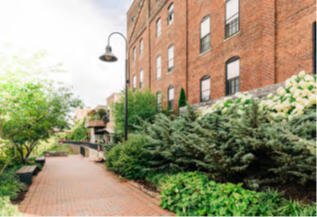 Lynchburg, Virginia, a city with a rich history dating back to its founding in 1757, has emerged as an outstanding example of conservation excellence. Through its unwavering commitment to environmental preservation and sustainable practices, Lynchburg has earned numerous accolades and national recognition.
Lynchburg, Virginia, a city with a rich history dating back to its founding in 1757, has emerged as an outstanding example of conservation excellence. Through its unwavering commitment to environmental preservation and sustainable practices, Lynchburg has earned numerous accolades and national recognition.
The Garden Club of Virginia is proud to present the City of Lynchburg with the Elizabeth Cabell Dugdale Award for Meritorious Achievement in Conservation.
Lynchburg’s journey toward conservation excellence is a testament to the city’s enduring commitment to environmental stewardship. Over the years, this historic city has consistently demonstrated a profound understanding of the interconnectedness between its urban landscape and the surrounding natural environment. From its very beginnings, with the creation of an 18-acre public space in 1862, Lynchburg’s dedication to conservation has evolved into a profound legacy of sustainable practices.
The numerous accolades garnered by Lynchburg over the years bear witness to its status as a conservation leader. The city’s partnership with The Lynchburg Garden Club in launching Operation Plant-A-Tree in 1981 exemplifies its innovative approach to promoting green initiatives. The program, which utilized proceeds from recycling to plant thousands of trees, resulted in an urban canopy that enhances air quality and supports local wildlife.
Lynchburg’s designation as one of Virginia’s earliest Tree Cities in 1983, in collaboration with the Arbor Day Foundation, further underscores its commitment to nurturing a thriving urban ecosystem. The city’s efforts in creating LEAF (Lynchburg Expressway Appearance Fund) in 1991 and upgrading its historic downtown with Dark-Sky compliant lighting and pollinator-friendly plantings in 2022 reflect a comprehensive approach to conservation that considers both aesthetics and ecological impact.
In 2019, Lynchburg’s decision to become a Bee City USA demonstrated its dedication to pollinator protection and ecosystem health. The city’s leadership in adopting No Mow April in 2023 to support pollinators further exemplifies its proactive stance in addressing environmental challenges.
The most recent initiative, in 2023, involving the planting of 3,000 native trees by Lynchburg’s Urban Forester showcases a commitment to restoring wildlife habitats and managing noise pollution, highlighting the city’s dedication to addressing multifaceted conservation concerns.
The city’s dedication to environmental preservation, sustainable development, and fostering a harmonious relationship between its urban landscape and nature sets an inspiring example for communities across the nation.
By recognizing Lynchburg’s achievements with the Dugdale Award, the Garden Club of Virginia celebrates not only the city’s successes but also the broader significance of conservation efforts that inspire positive change beyond the city and throughout the commonwealth.
Photo Courtesy of City of Lynchburg, Office of Economic Development & Tourism